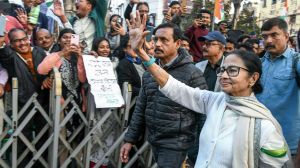Mind our languages
On September 14, the customary Hindi Diwas will be celebrated in various government offices. But it8217;s also time to celebrate, sustain a...

On September 14, the customary Hindi Diwas will be celebrated in various government offices. But it8217;s also time to celebrate, sustain and nurture the multilinguality of India, which has been a crucial instrument of its civilisational enterprise. Perhaps, no other country in the world can claim to have so many languages endowed with such a rich heritage and both classical and modern literature. If language is the measure of man, as has been eloquently stated by Nobel Laureate Polish poet Czeslaw Milosz, then Indians have so many measures entirely in keeping with their pluralistic ethos.
We have been underplaying this rich resource of imagination, creativity and identity because of a mistaken longing for a one language-one nation model. India, as its history amply demonstrates, has always spoken in many languages, shall and should continue to do so. Its unity is, fortunately and deeply, rooted in this diversity and not in any uniformity whether of language, religion, class, culture or cuisine. The linguistic diversity of India must be looked upon as a great resource rather than a handicap. This recognition must help draw a new agenda for languages in India.
I have a few suggestions:
8216;Hindi Diwas8217; should be converted into 8216;Bharatiya Bhasha Diwas8217;. Throughout the country, in all public offices, the concerned Indian languages would be celebrated. Hindi would then symbolise8212;which in its openness and vitality it already does in good measure8212;all the languages of India.
The Official Language Department should not only look after the use of Hindi in official work in the Central government and offices, but should also coordinate the use of other Indian languages in official work in the respective state governments.
A National Commission for Indian Languages should be set up to oversee and report to the Parliament and the nation on what8217;s happening in Indian languages in the fields of education, law, information technology, media and knowledge-production. It should have the authority to call for information and make suitable recommendations to concerned authorities.
A national fund should be set up for strengthening and expanding the interface between information technology and Indian languages to which various state governments should also contribute, apart from the Central Government.
The University Grants Commission must initiate a scheme under which all Central universities and at least two or three universities in each state are encouraged to establish departments of comparative Literature and translation. Indian linguistics is recognised the world over as a major contribution to the field of linguistics, but its study and research are under decline in India. Steps should be taken to ensure that we produce bright young linguists, which, incidentally would be of great help in the development of Information technology in the Indian context.
The Sahitya Akademi should undertake funding of at least one journal in each language featuring translations devoted to Indian literature.
An independent foundation to promote Indian literature abroad could be set up, aimed at supporting the translation, publication of and research into contemporary literature of Indian languages into foreign languages.
|
We8217;ve been underplaying a rich resource of creativity and identity because of a mistaken longing for a one language-one nation model. India8217;s unity is rooted in diversity, not in any uniformity of language 038; religion |
As contemporary India starts engaging the attention of foreign investment, a significant change is taking place in the conventional Indological construct. This image of a new India is already generating substantial interest in many areas of creativity, including its literature. However, this paradigm shift coincides with the emergence on the international scene of a powerful body of writing in English by Indians. While this is a welcome developments, it is also creating a grave distortion.
A popular belief, buttressed by the media, is growing that these English writers and their works are the most important and representative of Indian writers. Also, that nothing of much significance is happening in Indian languages. If earlier, literature in Indian languages was sidelined due to the Western obsession with ancient, classical and medieval India, it8217;s now being pushed to the margins by Indo-English writing.
While globalisation is making access to knowledge and information truly democratic and universal, it also tends to promote a tyranny of English language. This unfortunate development threatens the cultural diversity in a very substantial and fundamental way as also the existence, growth and survival of languages across the world. The linguistic diversity of the world is central to its diversity and must be protected and nourished at all costs. We need a universal campaign for saving languages, on the lines of campaigns for saving the environment.
India is perhaps the most multi-lingual country in the world today, one that has, through its Constitution, committed itself to the promotion and sustenance of all languages. Languages in India are both the sources and storehouses of its memory, heritage, identity and plurality, spirituality, history, culture, literature, knowledge-production, ethos and philosophy. It is thus ideally suited to take a major initiative in this regard.
The writer is an eminent litterateur and poet
- 01
- 02
- 03
- 04
- 05






























